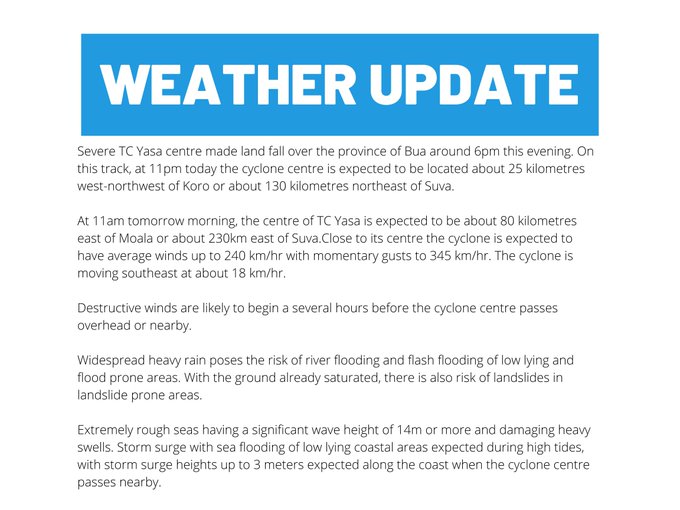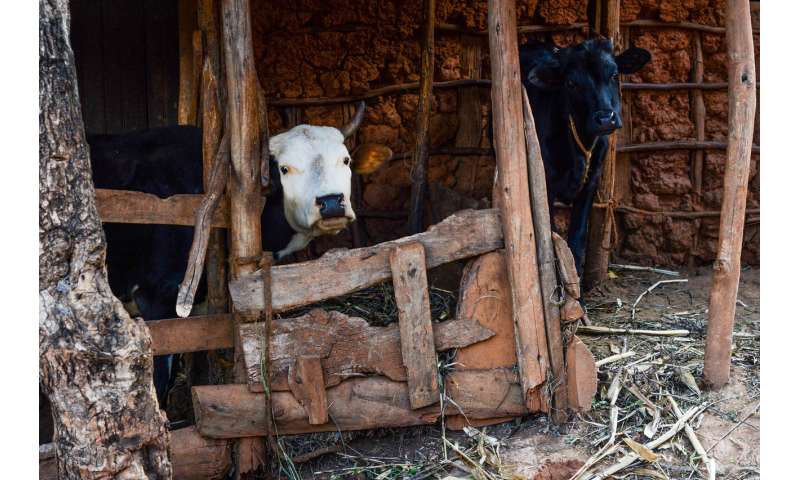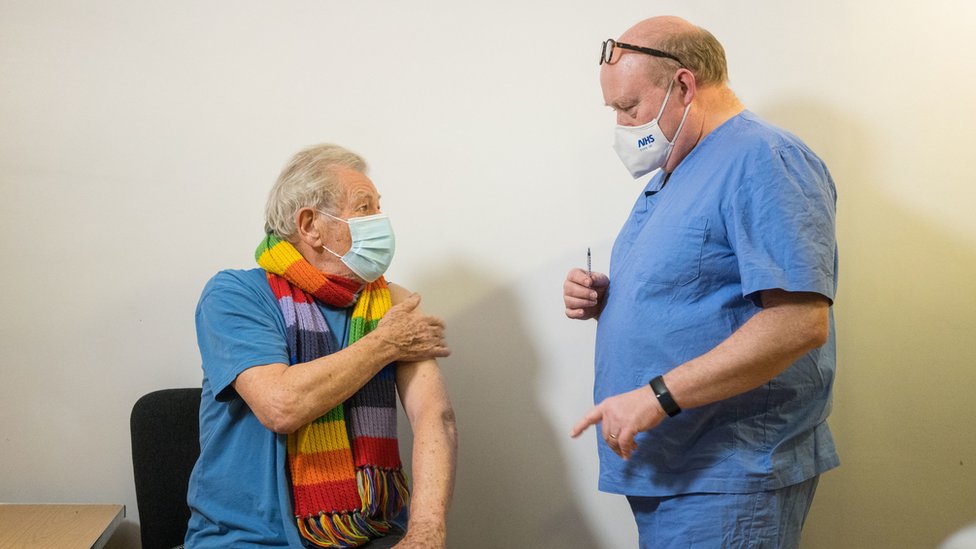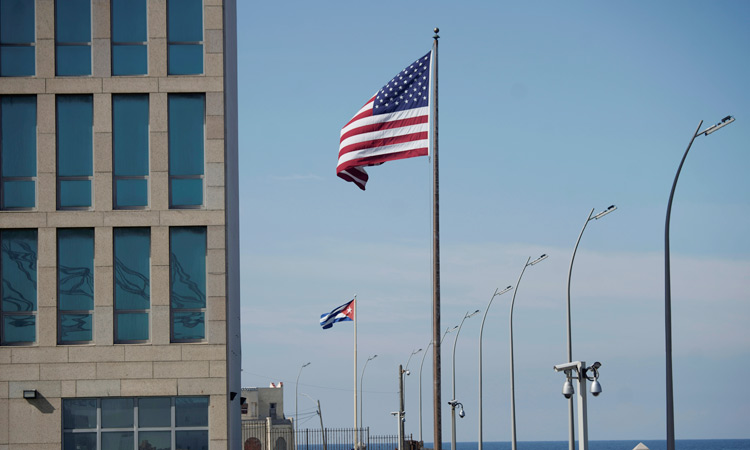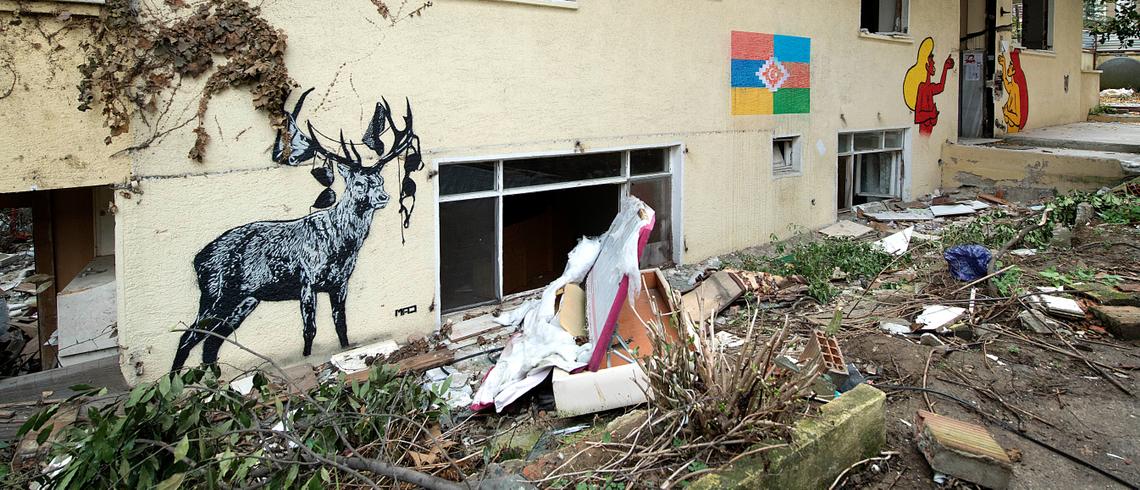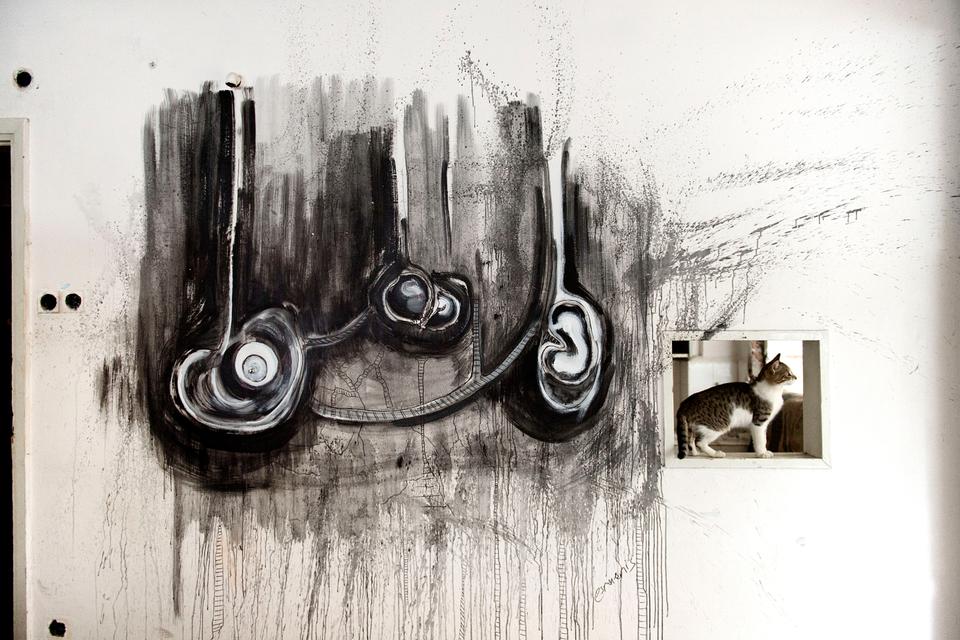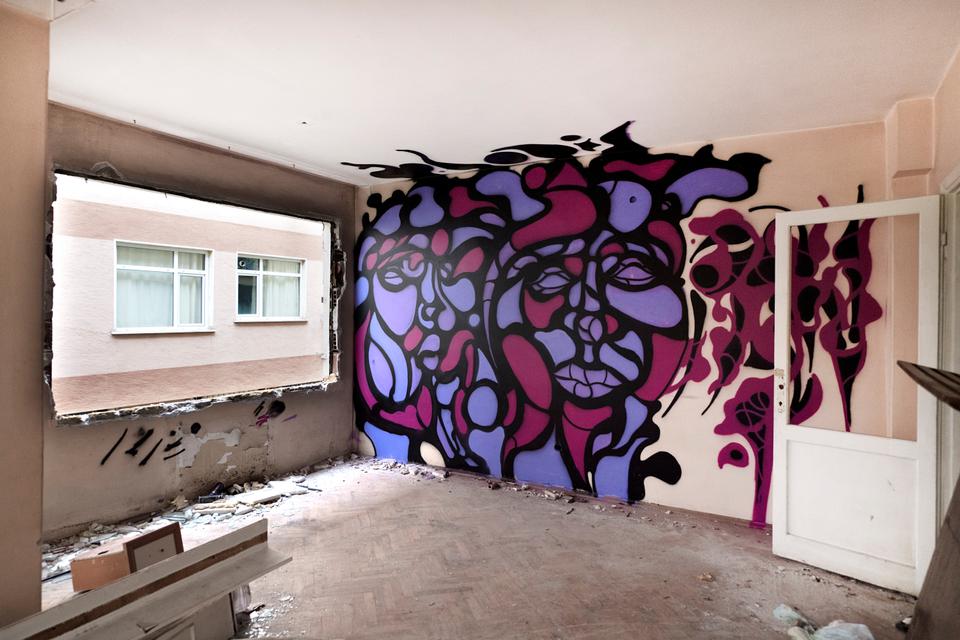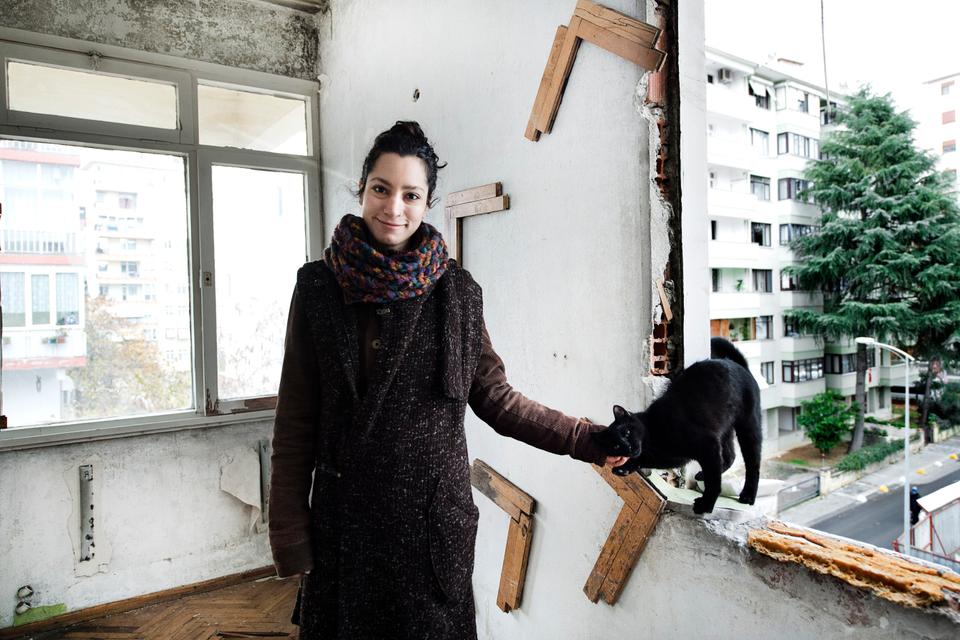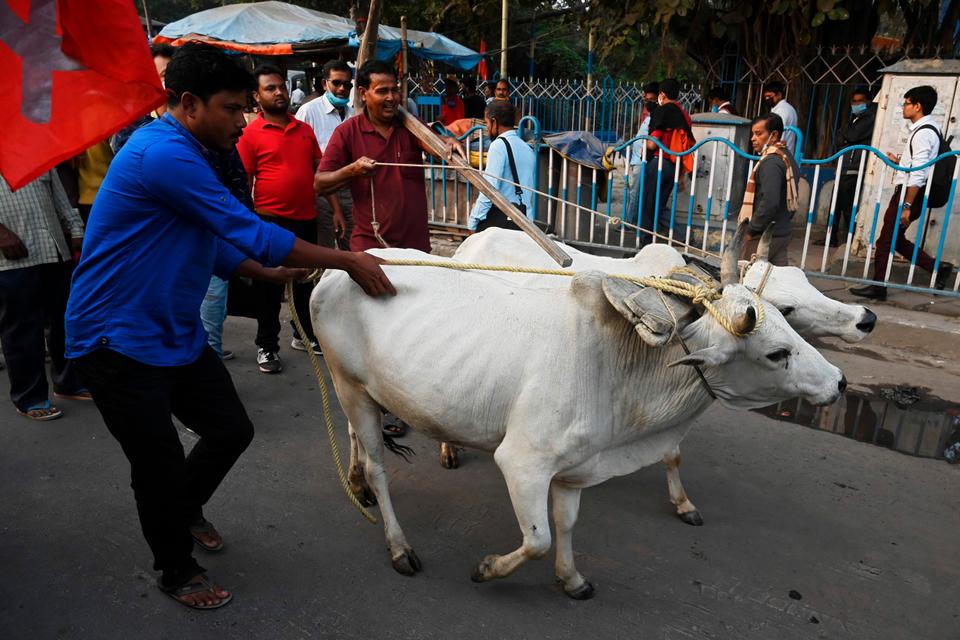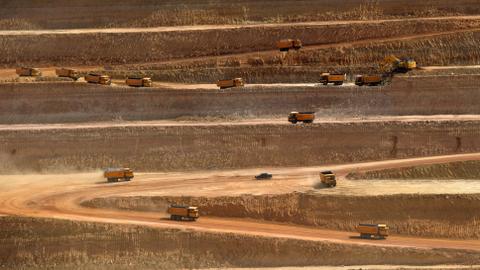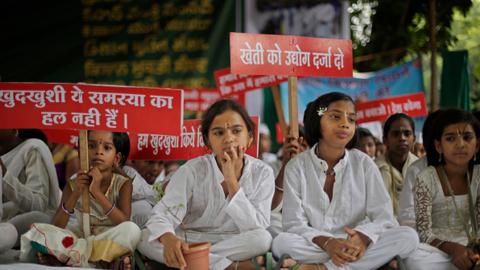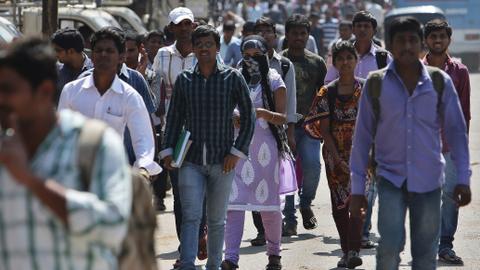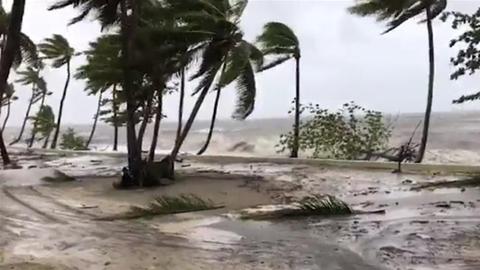
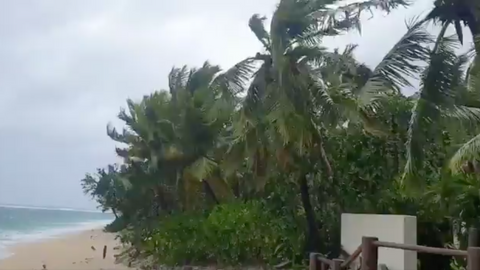
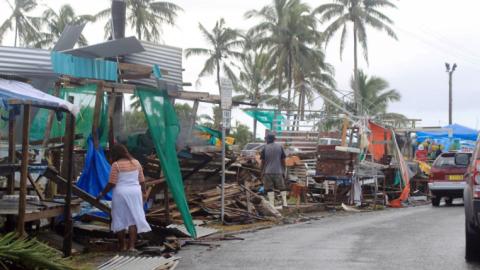
Fiji declared a state of natural disaster, ordering its entire population to take shelter ahead of a nightly curfew as a potentially devastating cyclone approached the Pacific Island nation.
Cyclone Yasa, a top category five storm, is expected to bring winds of up to 250 km/h and torrential rain across the South Pacific archipelago when it makes landfall overnight.
Still a few hours out from the worst weather, Fiji's Meteorological Service said storm force winds and heavy rains have been recorded in some parts of the country already.
Images shared on social media showed roads blocked by landslides, floodwaters and fallen trees.
By 0800GMT, the centre of Yasa is forecast to be 100 km east of the village of Yasawa-i-Rara and potentially over Fiji's fifth-most populous province of Bua, home to 15,000 people, Fiji's National Disaster Management Office said.
Reinforcing the threat, Fiji Prime Minister Frank Bainimarama told the country's near 1 million population to find safe shelter ahead of a 14-hour nationwide curfew beginning 0400GMT.
"The impact for this super storm is more or less the entire country," Bainimarama said in a video posted to Facebook.
Yasa would "easily surpass" the strength of 2016's Cyclone Winston, he added, referring to the southern hemisphere's most intense tropical storm on record, which killed more than 40 Fijians and left tens of thousands of people homeless.
The curfew order was given as part of the state of natural disaster order, which will run for 30 days.
Over 95 percent of the population live in the direct path of Yasa, said Bainimarama, adding weather forecasts anticipated flash flooding and "severe coastal inundation" that included waves up to 10 metres high
Residents in the areas deemed most at risk said the warnings were been heeded.
"We'll see what happens," said Alumita Bati, a chef from the capital Suva who was forced to evacuate with her son and husband from their corrugated tin house in a low-lying settlement outside the country's most populous city.
Bati's family boarded up the windows of their house with more tin before going to her sister's house on higher ground where she felt safer but still "a bit scared".
Fiji banned the running of public transport, and was taking precautions with some 50 foreign yachts moored in the southern part of the island chain.
"The boats have been moved to mangrove shelter, which provide good protection against the winds," said Cynthia Rasch, chief executive officer of Port Denarau Marina.
Fiji in October opened to foreign boats in a bid to revive a tourism industry hit hard by the coronavirus. Dubbed the Blue Lane initiative, foreign yachts have to follow stringent requirements to enter Fiji, including a 14-day quarantine out at sea.

Brittney Deguara
Landslides, flooding, strong gusts and large swells are adding to the “destructive” Cyclone Yasa, which hit Fiji two hours earlier than predicted.
The category 5 cyclone made landfall in Bua, Vanua Levu, at 6pm Thursday (7pm NZ time), two hours earlier than originally predicted, according to Metservice Fiji. A state of natural disaster has been declared and a strict curfew imposed until Friday morning.
The eye of the storm is passing 100 kilometres east of Yasaway-i-rara and 90km southwest of Labasa, according to the Fijian Government.
Update on Severe Tropical Cyclone Yasa pic.twitter.com/mTmhpICi54
— Metservice Fiji (@FJMETservice) December 17, 2020
Metservice Fiji is predicting the centre of the cyclone to be located about 25km northwest of Koro and 130km northeast of Suva by 11pm. By 11am on Friday, it will be about 80km east of Moala and 230km east of Suva.
READ MORE:
* Cyclone Yasa: Fiji prepares for damaging winds, flooding as category 5 storm heads for centre of island group
* One dead, dozens hurt and 2000 Fijian homes destroyed by Cyclone Harold
* Tonga declares state of emergency ahead of Tropical Cyclone Gita
New Zealand's National Institute of Water and Atmospheric Research (Niwa) is predicting “destructive impacts” for the islands, with damaging winds, flash flooding and dangerous seas expected with waves reaching heights of 14 metres or more.
Near the eye of the cyclone, wind speeds are forecast to average 240kmh with momentary gusts of up to 345kmh. The cyclone is moving southeast at about 18km an hour.
All major roads in the Ra Province’s Rakiraki are flooded. The region has been hit with rain and winds of more than 100kmh since 10am on Thursday, according to The Fiji Times.
Police are urging those in the region not to leave their houses.
A landslide at Viwa has covered the road completely. Contractors are working to clear it, The Fiji Times reported.
Traffic lights in Nadi's CBD have been turned off to prevent the controller getting damaged.
More than 850,000 people, or more than 95 per cent of the country’s population, are reportedly in the direct path of the cyclone. A total of 1417 people have been evacuated to 53 evacuation centres across the country. Police are providing security at all the centres.

Cate Heinrich, who is in Suva, said power outages have already been experienced across the islands, and people have been told to stock up on food and drinking water to last the next few days.
“Everyone is inside and no-one’s moving anywhere now while we wait it out,” she told Stuff. “Everyone’s [as] prepared as they can be at this stage.”

Fiji’s National Disaster Management Office (NDMO) is recommending people store enough water for up to seven days and boil it before drinking.
Heinrich, who is Unicef's Pacific chief of communication, said although she was not on the coast, she could feel the cyclone approaching. She described it as “very eerie”.
“It’s quite windy, the rain is coming down and ... you can feel that it’s coming, and it’s just going to get stronger. It’s getting closer and you can feel it.”
Heavy rain has already resulted in flooding in some areas. The Fiji Police Force issued a warning for people and children to stay clear of flooded areas.
“We have found a lot of children playing and left unsupervised in flooded areas, and please be reminded that we don’t want to arrest anyone due to disobedience of lawful order. However, if people continue to disregard our instructions, we will arrest them,” Fiji's assistant commissioner of police, Abdul Khan, said.

Yasa is the fourth most powerful tropical cyclone recorded in the South Pacific region, according to Weather Watch, and is believed to be the strongest storm on Earth at the moment.
The level of damage could equal that caused by Cyclone Winston in 2016.
“Do not be caught off guard by this latest storm,” Prime Minister Frank Bainimarama said on Wednesday as the weather system moved towards Fiji.
The NDMO officially declared the situation a state of natural disaster on Friday. The declaration will remain for the next 30 days, with more regulations to follow.
“The declaration of Tropical Cyclone Yasa as a natural disaster under the Natural Disaster Management Act 1998 is now in force,” NDMO director Vasiti Soko said at a press conference, according to The Fiji Times.
“One of the key priorities in that is it allows the National Disaster Management Office to call all of government’s asset to be on standby and to be mobilised,” Soko said.

“There are provisions in the regulations where we will work with the Fiji Police Force in regards to evacuating people.”
A hurricane warning is in force for the Yasawa Group, the northern and eastern half of Viti Levu, Yadua, Galoa, Kia, Mali, Vanua Levu, Taveuni and nearby smaller islands, Matuku, Moala, Totoya and Lomaiviti Group.
The Fiji Meteorological Service has also issued warnings for storms, gales, storm surges, damaging heavy swells, heavy rain, severe flooding, and flash flooding.
A nationwide curfew has been in place since 4pm local time and will continue through to 6am Friday morning.
“Unless you are evacuating, that means stay off the roads and stay safely sheltered,” Bainimarama said in a post on Facebook on Thursday.
Bainimarama visited an evacuation centre in Newtown on Thursday to meet those who had been displaced.
Unicef is working with the Fijian Government to ensure the hardest hit regions will receive appropriate resources and care on Friday.

Items such as tents, water and sanitation and health kits are prepared and ready to be distributed, with additional resources ready to be sent from Brisbane, Australia, if required.
“[We’re] hoping that the impact isn’t that huge, but we’re getting prepared,” Heinrich said.

